仁爱八年级英语下册 Unit7 topic2 导学案设计 (无答案)
仁爱版英语八年级下册Unit7Topic2SectionC课时教学设计
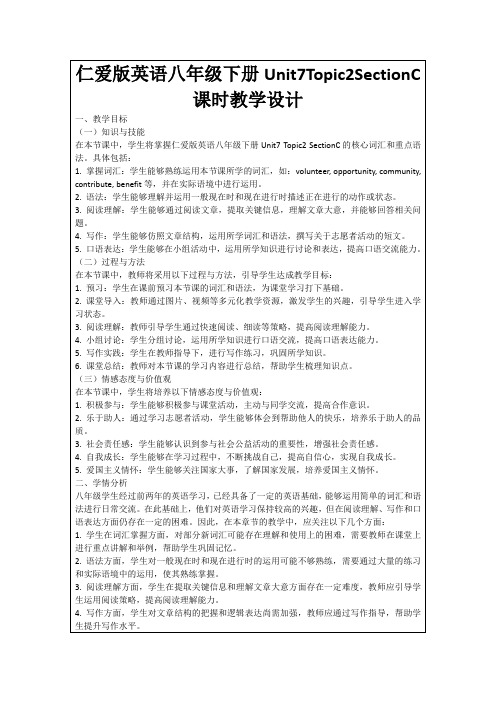
设想:教师巡回指导,关注每个学生的学习状态,提供个性化的反馈和帮助。
4.练习巩固:设计不同形式的练习,如填空、选择、改错等,帮助学生巩固所学知识。
设想:根据学生的掌握情况,适时调整练习难度和量,确保每个学生都能得到有效的练习。
5.口语作业:与家人或朋友分享本节课所学内容,讨论志愿者活动的经历或看法。学生可以通过录制视频或音频的形式,将口语作业提交给教师。
6.拓展阅读:推荐学生阅读一本与志愿者活动相关的英文书籍或观看相关纪录片,了解不同领域的志愿者活动,拓宽视野。
作业布置要求:
1.学生应按时完成作业,注意作业质量,保持书写工整、卷面整洁。
2.语法:学生能够理解并运用一般现在时和现在进行时描述正在进行的动作或状态。
3.阅读理解:学生能够通过阅读文章,提取关键信息,理解文章大意,并能够回答相关问题。
4.写作:学生能够仿照文章结构,运用所学词汇和语法,撰写关于志愿者活动的短文。
5.口语表达:学生能够在小组活动中,运用所学知识进行讨论和表达,提高口语交流能力。
4.写作方面,学生对文章结构的把握和逻辑表达尚需加强,教师应通过写作指导,帮助学生提升写作水平。
5.口语表达方面,学生在小组讨论和课堂展示中,可能存在紧张和不自信的现象,教师应鼓励学生大胆开口,增强其口语表达能力。
6.情感态度与价值观方面,八年级学生正处于青春期,具有较强的自我意识和独立思考能力,教师应结合教材内容,引导学生树立正确的价值观,培养其社会责任感。
5.课堂总结:通过师生共同总结,帮助学生梳理本节课的学习内容,强化重点知识。
设想:鼓励学生主动参与总结,通过绘制思维导图等方式,提高学生的归纳总结能力。
最新新仁爱英语八下Unit7-Topic2-导学案

仁爱英语八下Unit7 Topic2 导学案Section A学习目标: 1.对宾语从句的进一步学习2.重点学习掌握if/whether引导的宾语从句3.学习副词用法4.学习如何烹饪并讨论烹饪步骤学习过程:一、在文中找到、划出并背诵下面的短语。
1.做炒饭2.我不确定是否...3.尝试帮助别人4.对...感到骄傲5.你真是太好了!6.把煮过的肉精细地切好7.需要做某事8.在平底锅里加油9.把肉稍微炒炒10.把...炒几分钟11.你介意做某事吗12.烧些开水13.熬骨头汤14.把面条煮3-5分钟15.在碗里装满七八成的骨头汤16.垃圾食品17.对...没好处二、重难点解读1. But I’m not sure whether I can cook it well.点拨:I’m not sure whether(是否) + 宾语从句肯定句转换:I’m sure _______ I can cook it well.拓展:whether还可以换为if (是否) 但有区别whether 后面可跟or not , 而if 则不可以练习:a. 我不知道他是否会邀请我参加他们的美食节。
I don’t know _____________ he will _________ me ______ their food festival.I don’t know _____________ he will _________ me ______ their food festival or not.b. 我不确信她是否随后会给你发电子邮件。
I’m not sure ____________ she will _______ you an e-mail later on.I’m not sure ____________she will _______ you an e-mail ______ ______ later on.2. I’m glad that you are trying to help others. 译:点拨:be glad + (that) + 宾语从句为某事高兴be glad to do sth.. 乐意做某事链接:be afraid that+宾语从句be afraid to do sth.be sure that + 宾语从句be sure to do sth.3. It’s very kind of you . 同义句:You are very ________. 点拨:kind---善良,友好回忆: It’s + adj.+ of sb. to do sth. 句中的形式主语是________ 逻辑主语是________ 真正主语是___________练习:a. 告诉我那个消息你真是太好了。
仁爱版八年级下册英语unit7topic2教案范文

仁爱版八年级下册英语unit7topic2教案范文第一篇:仁爱版八年级下册英语 unit 7 topic2教案范文Unit7 Topic 2 Section ASection A 需用1课时。
重点活动是1a 和2。
教学目标:1.知道几种中餐的做法。
2.学习表示顺序的副词。
3.学习表示行为的副词。
教学过程:第一步:复习1.头脑风暴:让学生说出表示中餐的单词并让他们记在笔记本上。
2.以小组为单位谈论:Do you like cooking? Why? What do you like to cook? 例如:A: Do you like cooking? B: Yes, I do.A: Why do you like it? B: Because cooking is fun.A: What do you like to cook? B:I like to cook noodles.第二步:呈现1.阅读1a。
找出新单词,猜它们的意思并回答问题:What’s Kangkang doing?然后老师给出新单词的意思和问题的答案。
注意表示行为举止的副词的构成。
Notes: careful+ly→carefully light+ly→lightly fine+ly→finely slow+ly→slowly2.让学生跟读录音带,并划出表示顺序的副词。
3.老师把表示顺序的副词写在黑板上,要求学生用这些关键单词练对话。
First...Next...Then...After that...第三步:巩固1.学生独立完成1b。
按照1a对话的顺序将图片排序。
2.学生做1c之后,老师让学生总结表示顺序的副词和表示行为的副词的用法。
3.老师表演,让学生运用副词来描述。
例如:The teacher moves the desk lightly.然后,要求学生两人一组照样子做。
第四步:练习1.完成2:用所给词的正确形式完成说明,然后排列图的顺序。
仁爱版英语八年级下册Unit7Topic2SetionA教学设计

1.重点:本节课的核心词汇和短语,如:hobby, collect, stamp, coin, postcard等,以及一般现在时描述兴趣爱好的句子结构。
难点:如何引导学生将所学的词汇和句型灵活运用到实际情境中进行交流。
2.重点:听力技巧的培养,尤其是捕捉关键信息的能力。
难点:提高学生在听力过程中的注意力集中,以及对细节信息的准确把握。
6.小组合作:鼓励学生分组讨论,共同完成各种任务,培养学生的团队合作意识和沟通能力。
7.课堂小结:教师引导学生总结本节课所学内容,强调重点知识和技能,巩固学生的学习成果。
8.作业布置:设计富有针对性的作业,让学生在课后巩固所学知识,提高实际运用能力。
9.教学评价:采用多元化的评价方式,关注学生在知识、技能、情感态度等方面的全面发展。
3.教师通过例句和练习,讲解一般现在时在描述兴趣爱好时的句子结构,如:“I like collecting stamps./ He plays the guitar.”。
4.教师针对学生容易出错的地方,进行详细的讲解和指导,帮助学生掌握语法知识。
(三)学生小组讨论
1.教师将学生分成若干小组,每组选择一个兴趣爱好作为讨论主题。
4.学生在学习方法上,已经具备了一定的自主学习能力,但仍需教师在过程中给予适当的指导。因此,在教学过程中,教师应注重引导学生运用所学方法,提高学习效果。
5.学生在团队合作方面,具有一定的合作意识,但部分学生在小组活动中表现出依赖心理。教师应加强学生团队合作能力的培养,提高学生的主动参与度。
三、教学重难点和教学设想
4.提高听力技能,能够理解并获取关于他人兴趣爱好的信息。
5.提高口语表达能力,能够与他人就兴趣爱好进行简单的交流。
仁爱英语八年级下册导学案U7T2SA

课题:Unit 7 Topic2 I’m not sure whether I can cook it well.Section A第课时计划课时I think (that) we can have it on our school playground. 我认为我们可以在学校操场举办。
【导学环节】一、导二、思【基础识记】(A级)I.熟读文章,分角色朗读1a.【理解应用】(B级)II.翻译下面的短语和句子1.对…感到自豪________________2.精细地把熟肉切成片________________3. 干得好!________________4.在锅里放入一些油___________________5. 把肉稍微炒炒______________6.慢慢地加米饭_____________________7.加些盐____________________. 8.你真是太好了._____________________【迁移运用】(C级)III.用所给词的适当形式填空。
1.Would you like me ________________ (help) you?2. I’m glad that you are trying ______________ (help) others.3. Cut some cooked meat _________________(fine).4. Put a large deep pot on the _______________ (cook) carefully.5. What do I need _________________(do)?6.You need to add the rice ______________ (slow).7.________________(final) you should add some salt.【拓展提升】(D级)IV. 完成下面句子1. 我不确信她是否随后会给你发电子邮件。
仁爱版八年级英语下册Unit7Topic2单元整体教学设计

3.教师提出问题:“How can we show respect to others?”,引导学生用英语进行思考,为新课的学习做好铺垫。
(二)讲授新知
1.教师呈现本节课的核心词汇和重点语法,并结合图片、例句等进行讲解。
4.布置课后作业,巩固课堂所学,为下一节课的学习做好铺垫。
五、作业布置
为了巩固本节课所学知识,提高学生的英语应用能力,特布置以下作业:
1.书面作业:
-完成课后练习册中与本节课相关的练习题,强化词汇和语法的掌握。
-根据本节课的话题,写一篇关于“礼貌与尊重”的英语小短文,不少于60词,要求运用所学词汇和语法。
(三)学生小组讨论
1.教师将学生分成小组,每组根据教师提供的情景,运用所学词汇和语法进行角色扮演。
2.学生在小组内展开讨论,共同完成任务,培养团队协作能力和口语表达能力。
3.各小组展示成果,其他小组成员进行评价,教师给予指导和鼓励。
(四)课堂练习
1.教师设计一系列与新课内容相关的练习题,包括词汇填空、句子翻译、短文阅读等,帮助学生巩固所学知识。
教师应鼓励学生在完成作业的过程中,积极思考、主动探索,将所学知识内化为自己的能力。在作业批改过程中,教师要及时给予反馈,关注学生的进步和问题,针对性地进行指导,以提高学生的学习效果。同时,教师还需关注学生的作业负担,确保作业量适中,避免过度压迫学生,使其保持良好的学习状态。
4.部分学生对英语学习兴趣不足,缺乏主动学习的积极性。
为此,教师应关注学生的个体差异,因材施教,采用分层教学策略,提高学生的学习效果。同时,通过激发学生的学习兴趣,培养其自主学习能力,帮助他们克服学习中的困难,全面提升英语素养。在教学过程中,教师还需关注学生的情感需求,营造轻松愉快的课堂氛围,使学生在愉悦的情感状态下主动参与学习。
仁爱版八年级英语下册Unit7Topic2SectionA教学设计

3.树立正确的人生观和价值观,明白付出与回报的关系,懂得珍惜和感恩;
4.增强环保意识,关注社会问题,积极参与社会公益活动;
5.提高自信心和自尊心,勇于表达自己的观点和看法,尊重他人的不同意见。
一个全面的志愿者活动介绍。”
2.引导学生关注社会问题,培养他们的同理心和关爱他人的意识;
3.鼓励学生积极参与志愿者活动,将所学知识运用到实际生活中,体验助人为乐的喜悦;
4.培养学生的团队合作精神,让他们在志愿者活动中学会相互尊重、相互帮助;
5.培养学生热爱英语,树立终身学习的观念,为他们的未来发展奠定基础。
三、教学重难点和教学设想
(一)教学重难点
1.新词汇和短语的掌握:本节课涉及多个新词汇和短语,学生需要在实际语境中运用,以达到熟练掌握的程度。
Example:
I志愿者at the local hospital every Saturday. I help the nurses give medicine to the patients and talk to them to make them feel better. I want to be a volunteer because I want to help others and learn more about medical knowledge.
2.学生分享自己在本节课的收获,包括新词汇、句型、语法等方面。
3.教师强调参与志愿者活动的重要性,鼓励学生在日常生活中积极投身于志愿者事业,为社会贡献力量。
4.布置课后作业,要求学生运用所学知识,描述自己参加过的或想参加的志愿者活动,巩固课堂所学。
五、作业布置
1.请学生运用本节课所学的词汇和句型,写一篇关于自己理想中的志愿者活动的短文,不少于80词。要求描述清楚活动的性质、目的以及自己为何想参与其中,以此来巩固学生对一般现在时态的掌握,并激发他们参与社会实践的热情。
仁爱英语八年级下册Unit7Topic2导学案
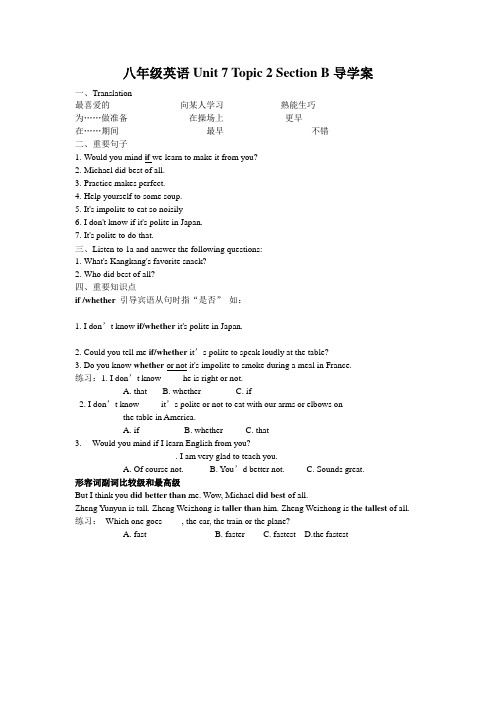
一、Translation最喜爱的向某人学习熟能生巧为……做准备在操场上更早在……期间最早不错二、重要句子1.Would you mind if we learn to make it from you?2.Michael did best of all.3.Practice makes perfect.4.Help yourself to some soup.5.It's impolite to eat so noisily6.I don't know if it's polite in Japan.7.It's polite to do that.三、Listen to 1a and answer the following questions:1.What's Kangkang's favorite snack?2.Who did best of all?四、重要知识点if /whether 引导宾语从句时指“是否”如:1. I don’t know if/whether it's polite in Japan.2. Could you tell me if/whether it’s polite to speak loudly at the table?3. Do you know whether or not it's impolite to smoke during a meal in France.练习:1. I don’t know ____ he is right or not.A. thatB. whetherC. if2. I don’t know ____ it’s polite or not to eat with our arms or elbows onthe table in America.A. ifB. whetherC. that3. ---Would you mind if I learn English from you?---__________. I am very glad to teach you.A. Of course not.B. Y ou’d better not.C. Sounds great.形容词副词比较级和最高级But I think you did better than me. Wow, Michael did best of all.Zheng Y unyun is tall. Zheng Weizhong is taller than him. Zheng Weizhong is the tallest of all. 练习:Which one goes ____, the car, the train or the plane?A. fastB. fasterC. fastestD.the fastest一、重点词汇第一次餐桌礼仪吃光为……干杯(祝福)举杯喝一小口记得要做某事记得不要做某事以……开始二、重点句子1.If you go to a formal western dinner party for the first time, you'd better know about western table manners.如果你第一次参加正式的西方宴会,最好了解一下西方的餐桌礼仪。
仁爱版八年级英语下册教学设计:Unit7Topic2SectionC
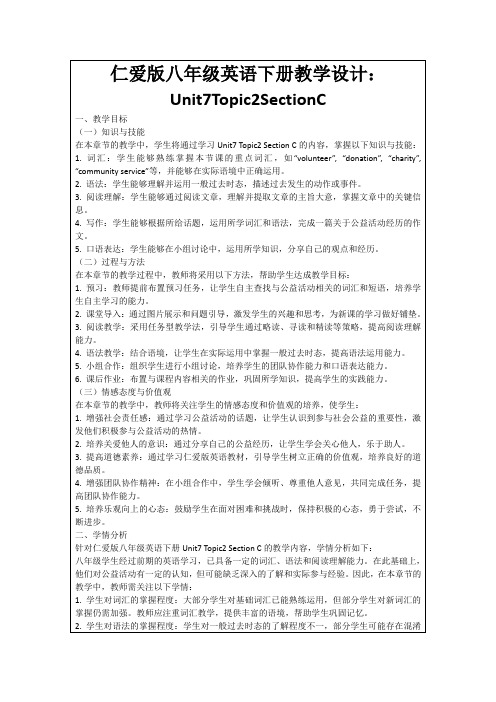
-分层次设计练习题,使不同水平的学生都能得到有效训练。
-对学生进行个别辅导,帮助他们克服学习难点。
(五)总结归纳
1.教学活动设计:
-邀请学生分享本节课的学习收获,总结词汇、语法和阅读理解方面的知识点。
-教师进行点评,强调重点,解答学生的疑问。
5.培养乐观向上的心态:鼓励学生在面对困难和挑战时,保持积极的心态,勇于尝试,不断进步。
二、学情分析
针对仁爱版八年级英语下册Unit7 Topic2 Section C的教学内容,学情分析如下:
八年级学生经过前期的英语学习,已具备一定的词汇、语法和阅读理解能力。在此基础上,他们对公益活动有一定的认知,但可能缺乏深入的了解和实际参与经验。因此,在本章节的教学中,教师需关注以下学情:
(三)学生小组讨论
1.教学活动设计:
-将学生分成小组,每组选择一个公益活动主题,如环保、支教等。
-小组内讨论:如何用一般过去时描述他们参与过的公益活动经历。
2.教学目的:
-提高学生的口语表达能力,培养合作意识。
-巩固词汇和语法知识,将所学知识应用于实际情境。
(四)课堂练习
1.教学内容:
-设计一系列练习题,包括词汇填空、语法填空、阅读理解等,以检测学生对新知识的掌握程度。
4.语法教学:结合语境,让学生在实际运用中掌握一般过去时态,提高语法运用能力。
5.小组合作:组织学生进行小组讨论,培养学生的团队协作能力和口语表达能力。
6.课后作业:布置与课程内容相关的作业,巩固所学知识,提高学生的实践能力。
(三)情感态度与价值观
在本章节的教学中,教师将关注学生的情感态度和价值观的培养,使学生:
-语法:介绍一般过去时态,通过例句和实际语境,让学生学会运用一般过去时描述过去发生的公益活动经历。
仁爱版八年级英语下册教案:Unit7Topic2教案

基于“课程标准、中招视野、两类结构”八英上Review of Unit7Topic2教案设计(复习课)张明一中李娟一.复习目标确定的依据:1. 课程标准相关要求:《英语课程标准》要求学生能在一定的语境中正确运用词汇知识、语法知识,语用知识等。
2.教材分析:本话题在复习上个话题的基础上,引入新的内容包括步骤的表达,描述方式的副词,做饭材料、做饭所用厨具以及吃饭所用餐具等词汇。
主要句型用提供帮助would you like me to help you?;赞美和鼓励Well done!重点语法内容:1.if和whether引导的宾语从句;2.副词的比较级和最高级以及it作形式主语的用法。
3.中招考点:词汇、短语的辨析,词性的分辨和转化常出现在单项选择题和词语运用题中,也是中考的考点;以及宾语从句和副词的比较级和最高级的考察。
4.学情分析:学生已学完了Units7Topic2,对主要知识点有所掌握,但是由于知识点较多,综合起来学生容易混淆。
特别短语的辨析及单词词性的转化较模糊。
对于这些问题应该师生共同探讨,分析,讨论并通过训练达到正确运用之目的。
二.复习目标1、能够正确说出P63—P70重点单词,词汇并能正确运用。
2、能熟练运用if和whether引导的宾语从句三.评价任务1.针对目标1,师生总结一些重点词汇、短语和句子,再通过训练,让学生能够正确运用P63—P70重点词汇、短语和句型。
2.针对目标2,总结Units7Topic1的重点语法,让学生能够掌握if/whether引导的宾语从句.四.教学过程复习目标教学活动评价要点要点归纳目标1: 能够正确复习指导 1复习内容:本单元P63—70的四会单词重点(一)词形转换:说出P63—P70重点词汇并能正确运用。
复习要求:听懂,会读,会说,会拼写,知道其汉语意思复习方法:看音标记单词,同桌互背复习时间:5分钟复习检测1:根据句意及首字母提示完成句子。
41. The tea is too strong. You need _________(add) some more water slowly.42. In parts of India, people use their _________(finger) to pick up the food.43. I think rice is grown in the _________ (south)part of China.44. It’s _________ (polite) to leave as soon asyou finish eating in China.45. It’s bad for your health if you always have_________ (quickly) breakfasts.一.通过复习巩固词汇及做习题、达到能掌握并灵活运用。
【教案】仁爱版八年级下册Unit 7 Topic 2 Section D 教案
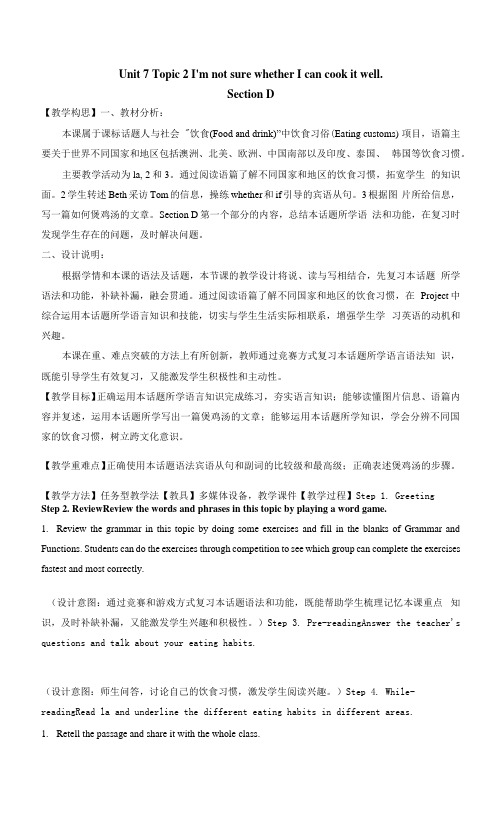
1.Review the grammar in this topic by doing some exercises and fill in the blanks of Grammar and Functions. Students can do the exercises through competition to see which group can complete the exercises fastest and most correctly.
Unit 7 Topic 2 I'm not sure whether I can cook it well.
Section D
【教学构思】一、教材分析:
本课属于课标话题人与社会 "饮食(Food and drink)”中饮食习俗(Eating customs)项目,语篇主要关于世界不同国家和地区包括澳洲、北美、欧洲、中国南部以及印度、泰国、 韩国等饮食习惯。
(设计意图:通过课堂小结,I可顾和梳理本课学习内容,帮助学生巩固知识,理清思路,抓 住重难点,达到预期的学习效果。)Step 8. HomeworkReview Section D.
1.Finish off the exercises.
2.Write a passage about table manners in different countries.
1.Retell the passage and share it with the whole class.
(设计意图:通过阅读语篇,划线不同地域不同的饮食习惯。读后复述,梳理对语篇信息的 把握。)Step 5. Post-readingSuppose you are Beth. Report the following inten iew notes in 2 to your partner.
仁爱版八年级英语下册Unit 7(Topic2 SectionA)导学案
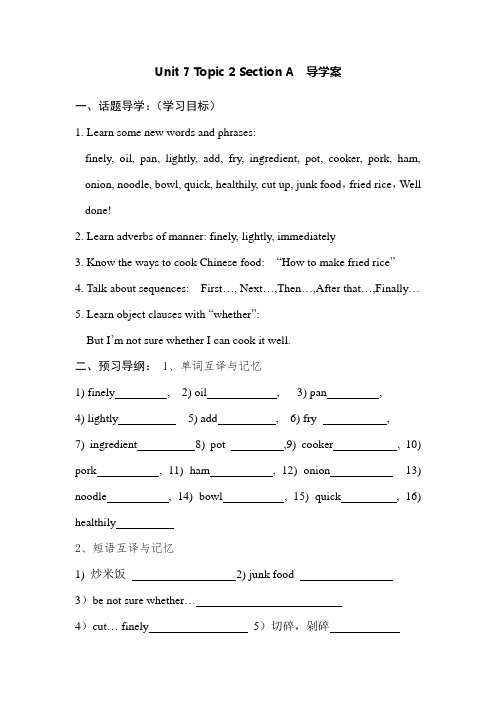
Unit 7 Topic 2 Section A 导学案一、话题导学:(学习目标)1. Learn some new words and phrases:finely, oil, pan, lightly, add, fry, ingredient, pot, cooker, pork, ham, onion, noodle, bowl, quick, healthily, cut up, junk food,fried rice,Well done!2. Learn adverbs of manner: finely, lightly, immediately3. Know the ways to cook Chinese food: “How to make fried rice”4. Talk about sequences: First…, Next…,Then…,After that…,Finally…5. Learn object clauses with “whether”:But I’m not sure whether I can cook it well.二、预习导纲:1、单词互译与记忆1) finely , 2) oil , 3) pan ,4) lightly 5) add , 6) fry ,7) ingredient 8) pot ,9) cooker , 10) pork , 11) ham , 12) onion 13) noodle , 14) bowl , 15) quick , 16) healthily2、短语互译与记忆1) 炒米饭2) junk food3)be not sure whether…4)cut… finely 5)切碎,剁碎三、课堂导练:单项选择( ) 1.The traffic is heavy now. So you must drive ______ .A. carefulB. carelessC. carefullyD. care( ) 2. —The soup tastes terrible ! —Yes. Jack _____ too much salt to it just now.A. addedB. cutC. cookedD. got( ) 3.I don’t know _______ Betty will be free tomorrow.A. whileB. untilC. whetherD. because( ) 4. —Get up______ , or you won’t catch the early bus. —OK . I will .A. suddenlyB. lightlyC. carefullyD. immediately ( ) 5.—You need to ______ the green onions before you put them in a pot.—I see. Thank you .A. make upB. cut upC. put upD. pull down四、课文解读:1. But I’m not sure whether I can cook it well . 但我还不能确定我是否能把它做好。
仁爱版八年级英语下册第七单元Topic2SectionA教案

Unit7 Topic2 SectionA精品教案Ⅰ. Material analysis本节课为该话题的第一节课,建议用1课时上完。
主要活动为Section A 的1a和2a。
本话题围绕Kangkang和同学们为美食节做准备而展开。
在Section A中,由Kangkang跟妈妈学做炒饭引出炒饭和面条的制作过程和方法, 要求学生掌握表示顺序的副词的用法,养成做事有规律、讲顺序的好习惯;语法重点学习由whether/ if引导的宾语从句。
通过本课的学习鼓励学生在其原有的愿望和兴趣的基础之上,勇于实践、大胆尝试,培养学生的自主探究精神。
Ⅱ. Teaching aimsKnowledge aims:1. 学习whether/ if 引导的宾语从句。
2. 学习表示顺序的副词的用法。
Skill aims:1. 能听懂有关食物制作的话题的对话,识别主题,并获取主要信息。
1/ 242. 能使用英语陈述食物的制作过程。
3. 能理解所给语言材料中事件的发生顺序和人物行为。
4. 能写出简单的文段。
Emotional aims:在其原有的愿望和兴趣的基础之上,勇于实践、大胆尝试,具有自主的探究精神。
Ⅲ. The key points and difficult pointsKey points:1. 学习whether/ if 引导的宾语从句。
2. 学习表示顺序的副词的用法。
Difficult points:使用英语陈述食物的制作过程。
Ⅳ. Learning strategies注意发现语言的规律,如:副词的构词规则等,并能运用规律举一反三。
2/ 24Ⅴ. Teaching aidsComputer multimedia projector, the pictures of oil, the pan, the pot, the cooker, pork, ham, onions, noodles and the bowl.Ⅵ. Teaching procedures3/ 24Ⅶ. Blackboard design9/ 2410/ 24Unit7 Topic2 SectionA精品教案Ⅰ. Material analysis本节课为该话题的第一节课,建议用1课时上完。
新版仁爱英语八年级下册英语教学案Unit7Topic 2(无答案)

英语(八下)有效课堂教学设计Unit 7 Topic2 I’m not sure whether I can cool it wellSection A导读单学习目标:1. 学习“whether”引导的宾语从句:But I’m not sure whether I can cook it well.2. 表示说明顺序的词:First … Second … Next … Then … After that … Finally学习过程:一读1a, 完成1b二.在文中找到,划出并背诵下面的短语和句子1. 做炒米饭_____________________2. 尽力去帮助他人___________________3. 对…感到自豪____________________4.你真是太好了!_____________________5. 精细地把肉切成片__________________6. 干得好!______________________7. 把肉稍微炒炒____________________8.慢慢地把米加进去___________________9. 把…炒几分钟____________________10. 烧些开水_______________________11. 熬骨汤_____________________12. 把火腿切碎___________________13. 把面条煮3到5分钟_________________15. 对做饭感到厌倦________________14. 在碗里装满七八成的骨头汤_______________________三、句型解释Whether ,用来引导宾语从句,不能省,后接陈述句。
I don’t know whether he will be late.注:I’m not sure whether(是否) + 宾语从句肯定句转换:I’m sure _______ I can cook it well.拓展:whether还可以换为if (是否) 但有区别whether 后面可跟or not , 而if 则不可以练习:a. 我不知道他是否会邀请我参加他们的美食节。
仁爱版八年级英语下册教学设计:Unit7Topic2SectionB
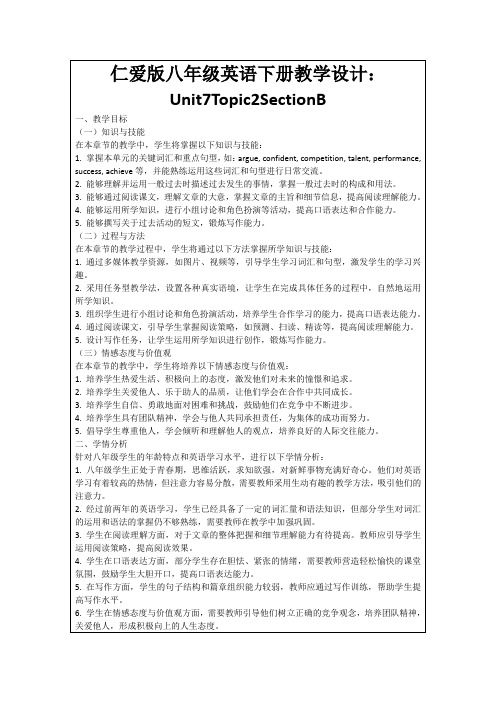
(一)导入新课,500字
在导入新课的环节,我将利用学生的生活经验和兴趣点,设计一个互动性强、富有启发性的活动。我会向学生展示一组关于学校运动会的照片,这些照片中有学生们熟悉的场景和人物,如跑步、跳远、投掷等比赛项目,以及同学们加油助威的画面。通过这样的视觉刺激,我提出以下问题:
“Can you remember the last school sports meeting? What did you do? How did you feel?”
(3)利用图表、时间线等可视化工具,帮助学生组织和记忆过去发生的事件。
(4)提供真实的语言环境,如角色扮演、故事复述等,鼓励学生运用所学词汇和句型进行实践。
(二)教学设想
1.教学流程:
(1)导入:通过展示与过去活动相关的图片或视频,引起学生对过去时态的兴趣,自然导入新课。
(2)新知呈现:结合课文,通过问答、讨论等形式,引导学生学习新词汇和句型,理解一般过去时的用法。
2.经过前两年的英语学习,学生已经具备了一定的词汇量和语法知识,但部分学生对词汇的运用和语法的掌握仍不够熟练,需要教师在教学中加强巩固。
3.学生在阅读理解方面,对于文章的整体把握和细节理解能力有待提高。教师应引导学生运用阅读策略,提高阅读效果。
4.学生在口语表达方面,部分学生存在胆怯、紧张的情绪,需要教师营造轻松愉快的课堂氛围,鼓励学生大胆开口,提高口语表达能力。
2.阅读作业:布置学生阅读一篇与本单元话题相关的短文,要求他们完成阅读理解练习,包括回答问题、填空、判断正误等。这样的练习有助于提高学生的阅读理解能力,同时巩固单元主题词汇。(短文及练习已提供)
3.口语作业:鼓励学生与家人或朋友分享他们在课堂上学到的关于一般过去时的知识,并尝试用英语讨论彼此的过去活动。这样的口语练习有助于学生将所学知识内化,增强口语表达能力。
最新仁爱版八年级英语下册unit7Topic2sectionD优质教学设计
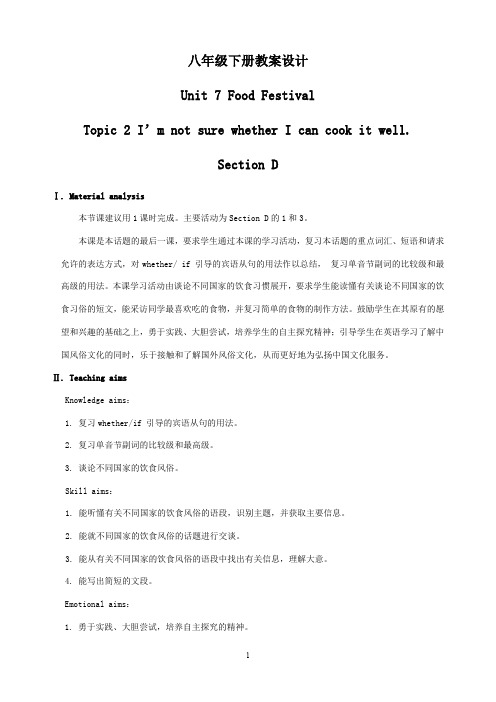
八年级下册教案设计Unit 7 Food FestivalTopic 2 I’m not sure whether I can cook it well.Section DⅠ. Material analysis本节课建议用1课时完成。
主要活动为Section D的1和3。
本课是本话题的最后一课,要求学生通过本课的学习活动,复习本话题的重点词汇、短语和请求允许的表达方式,对whether/ if 引导的宾语从句的用法作以总结,复习单音节副词的比较级和最高级的用法。
本课学习活动由谈论不同国家的饮食习惯展开,要求学生能读懂有关谈论不同国家的饮食习俗的短文,能采访同学最喜欢吃的食物,并复习简单的食物的制作方法。
鼓励学生在其原有的愿望和兴趣的基础之上,勇于实践、大胆尝试,培养学生的自主探究精神;引导学生在英语学习了解中国风俗文化的同时,乐于接触和了解国外风俗文化,从而更好地为弘扬中国文化服务。
Ⅱ. Teaching aimsKnowledge aims:1. 复习whether/if 引导的宾语从句的用法。
2. 复习单音节副词的比较级和最高级。
3. 谈论不同国家的饮食风俗。
Skill aims:1. 能听懂有关不同国家的饮食风俗的语段,识别主题,并获取主要信息。
2. 能就不同国家的饮食风俗的话题进行交谈。
3. 能从有关不同国家的饮食风俗的语段中找出有关信息,理解大意。
4. 能写出简短的文段。
Emotional aims:1. 勇于实践、大胆尝试,培养自主探究的精神。
2. 在了解中国风俗文化的同时,乐于接触和了解国外风俗文化,从而更好地为弘扬中国文化服务。
Ⅲ. The key points and difficult pointsKey points:1. 复习whether/if 引导的宾语从句的用法。
2. 复习单音节副词的比较级和最高级。
3. 谈论不同国家的饮食风俗。
Difficult points:写出关于不同国家的饮食风俗的短文。
八年级英语下册Unit7FoodfestivalTopic2 同步导学案 新版仁爱版

Unit 7 Food Festival课题:Topic 2 I’m not sure whether I can cook it well.Section A一、学习目标I.单词:pan, pot, cooker, bowl, oil, ingredient, pork, ham, onion, noodle, junkfood; add, fry, cut; finely, lightly, quick, healthilyII.词组:make fried rice, be proud of, cook very carefully, cooked meat, add some bones to, boil some water, well done, make bone soup, cut up ham, fill...with..., taste good III.句型:1. I’m not sure whether I can cook it well.2.I’m proud of you.3.It’s very kind of you.4.Well done!5.Y ou need to add the rice slowly.6.First, ... Second, ... Next, ... Then, ... After that, ... Finally, ...IV.功能:讲述做菜步骤.二、I.听音正音1.根据 P134 U7T2(63) (64)页的单词音标,试读两遍;听单词录音,跟读正音;看音形义性熟背,默写.2.听U7T2 SA 1a 的录音,完成 1b.听 1a 录音,跟读三遍.II.自查自悟读 1a、2a、3a, 找出下列重点短语,翻译并熟记.(1)做炒饭(3)做得好(5)用......装满.....III.自学互学(2)为... 感到骄傲(4)切碎火腿1.我不确定是否能做好它.【文中原句】I’m not sure whether I can cook it well.注意:if (1) “如果“,引导”主将从现”.(2)“是否”,引导宾语从句时=whether,应注意从句时态的变化:当主句是一般现在时时, 从句的时态根据实际情况而定;当主句是一般过去时时,从句也是一般过去时;当从句描述客观事实时,只能用一般现在时,此时,与主句时态无关.(3)只能用 whether 的情况:与 to do 连用;与 or not 连用;做介词宾语等.“文中原句“=I’m not sure I’m thinking aboutHe doesn’t mindI can cook it .I will appear at his party. it’s good ornot.2.你真是太好了.(太感谢你了.)【文中原句】It’s kind of you.【拓展】It’s+adj.+of sb.+to do sth.与It’s+adj.+for sb.+to do sth.的区别:当形容词形容 sb.的品质时,用介词 of;当形容词形容 to do sth.的性质时,用 for.请思考:(1)It is very helpful you to help me.(2)It is very important us to learn English well.3.首先,精细地切些熟肉.【文中原句】First, cut some cooked meat very finely.副词修饰动词时,通常放在动词后面.(1)认真地烹饪(2)小心地把锅放到炊具上(3)轻轻地炒一炒肉4.干得好!【文中原句】!表示表扬和鼓励的句子.类似的表达还有:Very good!非常好!Wonderful!非常好! Excellent!好极了!Perfect!太棒了 Good job! 干得好!5.你需要慢慢的添加米饭.【文中原句】You need to the rice .【拓展】add v. 增加,添加; add to... 添加到......上;add... to...将......加到上;(1)如果茶太浓, 就加点水.(2)4 加6 等于 10.If yousome water if the tea is too strong.4 _ 6, you can get 10.(3)你有什么要添加到清单上吗?Do you have anything to6.第二步,然后把火腿、白菜和青菜细细地切碎.the list?【文中原句】Then harm, and green .(1)完成一件事需要一连串的动作,需要一些表示先后顺序的副词.First, ...Second, ... Next, ... Then, ... After that, ... Finally, ...首先......,其次......,接下来......,然后......,之后......,最后......(2)cut... up(动副短语)将... 切碎.【拓展】cut sth.切开;cut sth. into (small pieces)将切成(碎片)昨天他割伤了自己.He厨师把牛肉切成薄片.The cook himself yesterday.the beef thin slices.【拓展】cut off 切断;中断;cut down v. 削减;砍倒;cut in 插嘴;超车;插入cut out 切断;删去;停止;关掉cutback 削减;修剪;cut short v. 缩短;打断;缩减cut from 从…上切下cut through 刺穿;抄近路走过四、当堂检测I.用所给词的适当形式填空1.The tea is too strong. You need (add) some more water slowly.2.Dongdong is preparing the (cook) meat now.3.I think rice is grown in the (south) part of China.4.Can you say five kinds of fruit (immediate)?5.They are always smiling and friendly and (politely) to passengers.II.阅读短文,根据语篇要求填空,使短文通顺、意思完整.每空限填一词.Kangkang wants to make fried rice for their food festival.But he is not sure he can cook it well. His mother is of him because he is trying to help others. She tells Kangkang to cut some cooked meat veryfirst, put some oil in the pan,and then fry the meat . After that,Kangkang needs to add the rice slowly, fry it for a few minutes and finally add some salt. He thinks is fun!一、学习目标U n i t7F o od Festival课题:Topic 2 I’m not sure whether I can cook itwell.Section BI.单词:snack, butter, pear, piece; slurp; impolite, polite, noisilyII.词组:favorite snack, a sandwich with butter, how to make it, two pieces of bread, put...over, put...together, cut...into small pieces, learn to make it from you,quite well, do better, do bestIII.句型:1. Could you tell us how to make it?2.Take two pieces of bread and put some butter on them.3.Would you mind if we learn to make it from you?4.You did quite well. But I think you did better than I. Michael did best of all.5.Practice makes perfect.6.I don’t know if it is polite in Japan.IV.功能:做菜步骤;副词比较级、最高级.二、自I.听音正音1.根据 P134 U7 T2 (65) (66) 页的单词音标,试读两遍;听单词录音,跟读正音;看音形义性熟背,默写.2.听U7T2 SB 1a 的录音,完成 1b.听 1a 录音,模仿跟读三遍.II.自查自悟读 1a、1c, 找出下列重点短语,翻译并熟记.(1)最喜欢的小吃(2)怎么做(三明治)(3)两片面包III.自学互学(4)切成碎片1.你介意我们向你学习做三明治吗?【文中原句】Would you mind if we learn _to makeit from you?learn 用法归纳:learn sth 学习……; learn to do sth 学习做某事;learn sth by oneself 自学……=teach oneself sth;learn (…) from sb 向某人学习(做某事);和 study 的区别:study 可以作不及物动词,如I’m studying now. study 也可以作不及物动词,不过 study sth 更强调研究…, learn 强调学习具体的知识,如 learn English.2.你做得很好.【文中原句】You did quite .但是我认为你比我做得好.【文中原句】But I think you did than I.我们所有人中迈克做得最好.【文中原句】Michael did .well, better, best 都是副词,作动词 did 的状语.better, best 是 well 的比较级和最高级.【拓展】形容词、副词有三个等级,即原级、比较级和最高级.(1)形容词、副词比较等级的构成.①副词比较等级的规则变化与形容词比较等级的规则变化大致相同.fast-- late-- slowly-- hard --noisily-- _ quickly-- _②下列副词的比较等级为不规则变化:badly -- little -- well-- much--far-- /(2)形容词和副词比较等级的用法.①原级:双方程度相同时,常用结构:as+adj./adv. 原级+as,意为:......和......一样.... .否定形式:not as/so+adj./adv.原级+as,意为:......不如... .他跑得如此快.He runs so .莫扎特和他姐姐弹得一样好.Mozart played his sister. Maria 没有 Jane 学习努力.Maria doesn’t study Jane.② 比较级:两者比较时,常用结构:adj./adv.比较级+than,意为:比......更 ....... .否定形式:less+adj./adv.原级+than,意为:......不如 ... . 他比我游得好.He swam _________________ than I. 他做作业比他哥哥认真.He does homework than his brother. 他工作的时间比以前少了.He works than he used to. ③ 最高级:三者或三者以上作比较时,常用结构:the+ adj./adv.最高级+ in/of/among....... (比较范围),意为:某人(或某物)在某范围内最 ........ .副词最高级前可省略 the. Michael 在我们班跳得最高.Michael jumps in our class. 我是我们班跳得最远的.I jump in my class.3. 我不知道在日本这么做是否有礼貌.【文中原句】 I don’t know if it’s polite in Japan.if conj. 是否,引导宾语从句,不可省略. 四、当堂检测 I. 单项选择( )1. Could you tell me ___it is true or not?A. ifB. whetherC. thatD. what( )2. It’s polite___up your hand before answering the questions.A. putB. puttingC. putsD. to put( )3. In Japan, it’s polite to eat soup___and finish all the rice.A. noisilyB. noiseC. noisyD. noises( )4. We’re not sure___we will go out tomorrow. We will go swimming ___it is sunny.A. if; whetherB. if; thatC. whether; ifD. what; if( )5. -Do you think Michael works ___ than Kangkang and Jane?-Yes, I think so. He works ___of the three.A. hard; harderB. harder; hardestC. hardest; hardD. hardest; harderII.用方框内所给词的适当形式填空Micheal’s favorite snack is a sandwich butter, honey and a pear. Do you knowto make it?, take two pieces of bread and put some butter on them. Next, cut a pearinto small pieces . Then put them on the bread lightly. After that, put some honey the pear slowly. Finally, put the pieces of bread . Micheal,Janeand Kangkangthe sandwich together. Kangkangverywell. Jane did better. Micheal didof all. We all know that practice makes .一、学习目标 Unit 7 Food Festival课题:Topic 2 I’m not sure whether I can cook itwell.Section CI. 单词:formal,manner,napkin,fork, dish,quietly,dine,spoon,chopstick,finger, lap,elbow. II. 词组:for the first time, table manners, eat up, drink to sb./ sth. III. 句型: 1. It’s polite to eat up the food on your plate.2. You don’t know whether it’s polite or not to speak loudly at the table.3. Remember not to drink too much. IV. 功能:谈论不同国家的餐桌礼仪.二、make, together, good, one, how, do, perfect, with, over, careI.听音正音1.根据 P134 U7 T2(67)(68)页的单词音标,试读两遍;听单词录音,跟读正音;看音形义性熟背,默写.2.听U7T2SC 1a 的录音,完成 1b、1c.听 1a 录音,跟读三遍.II.自查自悟1.读1a,找出下列重点短语,翻译并熟记.(1)以...开始(3)吃光(5)举起杯子(7)指向某人III.自学互学(2)餐桌礼仪(4)为某人敬酒,干杯(6)喝太多1.如果你首次参加一个正式的西餐聚会,你最好知道一些西方的餐桌礼仪.【文中原句】If you go toa dinner party , you had better knowabout .(1)for the first time 第一次2012 年,我第一次到北京去度假.I went to Beijing for my holiday in2012 .(2)table manners 餐桌礼仪manner“方式;举止;态度”He has no at all. 他一点也没礼貌.2.吃光盘中的食物是礼貌的.【文中原句】It’s polite the foodthe plate.eat up 动副结构:吃完,吃光他如此饿,以至于吃完了所有的食物.He was so hungry he allthe food.把它吃光!Eat !【拓展】come up 上升; cut up 切碎; get up 起床give up 放弃; go up 上涨; stay up 熬夜; take up 占用;3.可能你不知道在用餐时大声说话是否礼貌.【文中原句】you don’t knowwhether it’s polite to speak loudly the table.whether , if 的用法我们在 Section A 中已经学过,现在来复习巩固一下.(1)引导宾语从句时,可互换.He asked me Tom was late.他问我 Tom 是否迟到了.(2)whether 后可接 or not,而if 不能.He doesn’t know it’s right or not.他不知道这是否是对的.(3)不定式前用 whether 而不用 if.I don’t know?/to go or to stay at home.我不知道是该走还是该留在家里.(4)介词后用 whether 而不用 if.I’m thinking about to leave right now.我在考虑是否马上离开.(5)注意引导宾语从句时从句的时态变化.My teacher told me the earth round the sun. 老师以前告诉我地球绕着太阳转.He wondered if she .他想知道她是否会来.4.记得不要喝太多.【文中原句】Remember _drink too much.(1)remember to do s th.记得要做某事; remember doing s th.记得做过某事(事情已经做了),否定形式为:remember not to do sth. .Please remember the door.请记得关门.Iremember the door. 我记得关上门了.Remember late. 记着别迟到啊.(2)too much 在句中作状语,修饰动词 drink.【区分】much too “太,非常”,修饰形容词或副词.too much 修饰动词或动词短语及不可数名词;too many 修饰复数名词Don’t eat candy, or you will be ____________ fat.不要吃太多糖,否则你会很胖.Although apples are good, still don’t eat of them.四、当堂检测I.汉译英.[来来~源:%^*中教网&]1.露西昨天吃完了冰箱里的所有苹果.Tom the in thefridge. 2.我们的问题是如何能给丹尼尔筹钱.Our problem is raise money Daniel.3.这鱼闻起来真美味.我想把它吃完.The fish . I want to .4.(为了) improve his oral English, he often goes to the English corner.5.Our English class often (以……开始) a lively song, so we all like it.6.When he was (为……干杯) me, I gave him a hug.7.The child is at the age of two, he needs someone to (切碎) his food for him.II.把下列句子合并成一个含有宾语从句的复合句.1.I don’t know. Is she a nurse?2.Do you know? Is it good to play games too much?3.I’m not sure. Is he at school?4.I want to know. Will it be sunny tomorrow?5.I don’t know. Is it polite to eat up the food on your plate?一、学习目标Unit 7 Food Festival课题:Topic 2 I’m not sure whether I can cook itwell.Section DI.单词:southern, pick, courseII.词组:pick up, around the world, use … to do …III.句型:1. People around the world have different eating habits.2.There are two or more courses for every meal and people use knives and forks to eat.3.In parts of India, people use their fingers to pick upthe food. IV.复习 whether/if 引导的宾语从句的用法.副词的比较级.V.功能:谈论不同国家的饮食风俗.I.听音正音1.根据 P136 U7 T2(69)(70)页的单词音标,试读两遍;听单词录音,跟读正音;看音形义性熟背,默写.2.听U7T2SD 1 的录音,模仿跟读三遍.3.Read the passage again and underline all the different eating habits in different areas.II.自查自悟读 1a、1c, 找出下列重点短语,翻译并熟记.(1)远离(3)同时III.自学互学(2)用…做某事1.全世界的人们有不同的饮食习惯.【文中原句】People havedifferent eating .around the world = all over the world = throughout the world “全世界”那是众所周知的. It is known【拓展】living habit 生活习惯; learning habit 学习习惯2.在北美,澳大利亚和欧洲,每顿饭有两道或两道以上的主菜,人们用刀叉吃饭.【文中原句】 In and , there are two or more each meals and peopleuse_and forks .(1)course 可数名词,意为“一道菜”.主菜是烤鸭.Themain(2)A knife and a forkA knife and forkis the roast duck.(be) on the table. 一把刀和一把叉在桌上. (be) on the table. 一副刀叉在桌上.3.在印度有些地方,人们用手指头拿食物吃.【文中原句】In parts of , people use their fingers the food.(1)pick up 拿起,捡起;接某人;取某物;搭便车.电话铃响了,我拿起了话筒.The phone rang and I 我的哥哥会开车来接你的.My brother willityou.in the car.(2)use … to do sth 表示“用…做某事”还可以表达成use… for doing sth. 如:We can use QQ (talk) /for(talk) with each other.4.在中国的南方人们吃米多,而在北方人们常吃面食.【文中原句】In China, people eatrice a lot, in the_people often eat _ .south, n. 南方;southern, adj. 南方的海南岛在中国的南部.Hainan island is in the of China.【拓展】north → northern, east → eastern, west → western四、当堂检测I.完成下列句子:1.汤姆跑的和杰克一样快.彼得跑的最快.Tom runs Jack. Peter runs of all.2.朱迪舞跳得比我好.玛丽是所有的女孩中跳舞跳得最好的.Judy dances than me. Mary dances of all the girls.3.他打篮球比你棒的多.He plays basketball than you.4.雪下得越来越大.It is snowing .5.我想去中国南部的名胜古迹看看.I hoe to visit some in the part of China.II.单项选择:( )1.All Chinese use chopsticks .A. eatB. to eatC. eatingD. ate( )2. I don’t know if Kangkang ,if he _ ,I will call you.] A. will come; will come B. will come; comesC. comes; will comeD. comes; comes( )3. Yesterday Jane’s mother was ill, so she help me.A. needed notB. doesn’t need toC. needn’tD. didn’t need ( )4. Would you mind the door?A. openB. opensC. openingD.I open( )5.–Would you mind if I smoke here? .......... You had better not.A. Of course notB. SorryC. Of courseD. Certainly notⅢ. 句型转换.1.Would you mind opening the door?(改为同义句)Would you mind ________ open the door?2.My favorite food is dumplings. (对划线部分提问)favorite food?3.Do people in India eat with their right hands? Can you tell me?(合并为含宾语从句的句子)4.These courses aren’t the same as those ones. (改为同义句) These courses are _ those ones.5.You’d better cook chicken soup tonight. (改为否定句) You’d cook chicken soup tonight。
仁爱版八年级英语下册教案Unit7Topic2教案

1、能够正确说出P63—P70重点单词,词汇并能正确运用。
2、能熟练运用if和whether引导的宾语从句
三.评价任务
1.针对目标1,师生总结一些重点词汇、短语和句子,再通过训练,让
学生能够正确运用P63—P70重点词汇、短语和句型。
2.针对目标2,总结Units7Topic1的重点语法,让学生能够掌握if/whether引导的宾语从句.
四.教学过程
复习目标
教学活动
评价要点
要点归纳
目标1:能够正确说出P63—P70重点词汇并能正确运用。
复习指导1
复习内容:本单元P63—70的四会单词
复习要求:听懂,会读,会说,会拼写,知道其汉语意思
复习方法:看音标记单词,同桌互背
复习时间:5分钟
复习检测1:
根据句意及首字母提示完成句子。
41. The tea is too strong. You need _________ (add) some more water slowly.
C. certain; whether D. certain; that
4._____ the 2008 Olympic will be held in Beijing is not known yet.
A Whether B. If
C. Whenever D. That
5.No one was sure _____ he would be asked to speak next year.
当堂训练
( )1.. It’s____to____the food on your plate, so don’t take more food than you need.
【原创导学案】最新备课仁爱版八年级英语下册-Unit7 Topic2 Section B导学案

Unit 7 Topic 2 Section BName Class1.学习if / whether引导的宾语从句。
2.学习单音节副词的比较级和最高级。
3.了解不同国家的餐桌礼仪。
【自主学习,预习课文】一.听1a 回答下列问题。
a. What’s Michael’s favorite snack?_____________________________________________b.Who did best of all?___________________________________________________________二、在文中找到,划出并背诵下面的词语1.黄油____________________2.倾泻,倒出___________________3.梨____________________4.有礼貌的________________5.不礼貌的___________6. 喧闹地________________7. 匙,调羹________________8. 叉,餐叉________________9. 筷子___________________三.if /whether 引导宾语从句时指“是否”如:1. I don’t know if/whether I need to obey all the rules while I’m having dinner with my friends.2. Could you tell me if/whether it’s polite to speak loudly at the table?3. I don’t know if/whether you are right.四.通过阅读你能找出多少if或whether引导的宾语从句?____________________________________________________________________________ _________________________________________________________________________ ____________________________________________________________________________ ____________________________________________________________________________ ____________________________________________________________________________ if和whether都可译为\"是否\",二者引导宾语从句时通常可以互相替换,而以下几种情况中, 只能用whether:1. 强调两方面的选择,特别是句中有or not时。
- 1、下载文档前请自行甄别文档内容的完整性,平台不提供额外的编辑、内容补充、找答案等附加服务。
- 2、"仅部分预览"的文档,不可在线预览部分如存在完整性等问题,可反馈申请退款(可完整预览的文档不适用该条件!)。
- 3、如文档侵犯您的权益,请联系客服反馈,我们会尽快为您处理(人工客服工作时间:9:00-18:30)。
仁爱八年级英语下册Unit7topic2导学案一读1a, 完成1b二.在文中找到,划出并背诵下面的短语和句子1. 做炒米饭_____________________2. 尽力去帮助他人___________________3. 对…感到自豪____________________4.你真是太好了!_____________________5. 精细地把肉切成片__________________6. 干得好!______________________7. 把肉稍微炒炒____________________8.慢慢地把米加进去___________________9. 把…炒几分钟____________________10. 烧些开水_______________________11. 熬骨汤_____________________12. 把火腿切碎___________________13. 把面条煮3到5分钟_________________15. 把这些图片排好顺序________________14. 在碗里装满七八成的骨头汤_______________________16. 对做饭感到厌倦___________________17. …的优点_______________________18. 西/中式快餐店____________________19. (未来)几分钟后____________________三、句型解释点拨:I’m not sure whether(是否) + 宾语从句肯定句转换:I’m sure _______ I can cook it well.拓展:whether还可以换为if (是否) 但有区别whether 后面可跟or not , 而if 则不可以练习:a. 我不知道他是否会邀请我参加他们的美食节。
I don’t know _____________ he will _________ me ______ their food festival.I don’t know _____________ he will _________ me ______ their food festival or not.b. 我不确信她是否随后会给你发电子邮件。
I’m not sure ____________ she will _______ you an e-mail later on.I’m not sure ____________she will _______ you an e-mail ______ ______ later on.2. I’m glad that you are trying to help others. 译:点拨:be glad + (that) + 宾语从句---为某事高兴…;be glad to do sth.. 乐意做某事链接:be afraid that+宾语从句--- be afraid to do sth.---be sure that + 宾语从句--- be sure to do sth.---3. It’s very kind of you . 同义句:You are very ________. 点拨:kind---善良,友好回忆: It’s + adj.+ of sb. to do sth. 句中的形式主语是________ 逻辑主语是________ 真正主语是___________练习:a. 告诉我那个消息你真是太好了。
It’s very ______ _____ you _____ ______ ____ the news.b. 他们杀死那些动物真是太残忍了。
It’s very ________ _____ them ______ ____ the animals.拓展:kind还可以用作名词,意思是_________ --- a kind of____________ all kinds of______________ 4. First, cut some cooked meat very finely. 译:点拨:cooked meat---煮熟的肉--- cooked在此是过去分词(相当于形容词)作定语链接:fried rice___________ fried chicken__________boiled water____________ boiled eggs____________思考:你发现过去分词(相当于形容词)作定语有什么特点了吗?5. 读2a找出表示先后顺序的词首先_________其次__________再次__________然后__________之后_______________最后__________练习:完成2b6. Cut up ham, cabbage and green onions finely. 译:点拨:cut up… 把…切碎注意: 如果cut的宾语是代词要放在________ 点拨:up在此意思是---彻底,完全地链接:eat up_________ use up__________ burn up__________ clean up__________7. Fill the bowl 70%-80% full with bone soup.译:点拨:fill… with … ---用…把…装满fill 的词性是_______, 词义是________链接:be full of … ---充满… full 的词性是_______, 词义是________练习:a. 请把瓶子装满水。
Please ________ the bottle _________ water.b. 不要在碗里盛太满的汤。
________ ________ the bowl _______ too _______soup.c. 屋里满是人。
The room ______ _______ ____ people.8. People go to restaurants because they’re tired of cooking. 译:____________________________________________点拨:be tired of sth./doing sth.---对…感到厌烦反义词组:________________________练习:a. 他对每天干同样的事情感到厌烦。
b. Tom对越来越难的俄语感到厌烦。
四.语法重点--- 副词本课出现了很多修饰动作的副词,读1a找出下面副词所修饰的动词_______well ________carefully _________________finely ______________lightly ____________slowly总结:英语中副词修饰动词要后置练习:唱得好/好好地唱______________ 仔细听/听得仔细___________________ 大声说____________________二部分一.在文中找到下面副词的比较级和最高级1.well_______/________2.early________/________3. hard_______/________4. late_______/________ 二.在文中找到,划出并背诵下面的短语1. 做炒米饭_____________________2. 尽力去帮助他人__________________3. 对…感到自豪_________________4.你真是太好了!_______________________5. 精细地把肉切成片________________6. 干得好!_________________7. 把肉稍微炒炒______________8.慢慢地把米加进去________________9. 把…炒几分钟____________________10. 烧些开水_____________________11. 熬骨汤_______________________12. 把火腿切碎___________________13. 把面条煮3到5分钟______________________14 对做饭感到厌倦________________15 …的优点________________________16 (未来)几分钟后____________________三.在文中划出下面的句子并翻译1. First, take two pieces of bread and spread butter on them. 译:点拨:a piece of … --- 一片/张/块/条/则…, 后面常跟不可数名词拓展:a piece of paper______________ a piece of glass_______________ a piece offurniture____________________a piece of music______________ a piece of advice______________ a piece ofinformation_________________练习:a. 我有三条消息要告诉你。
I have ________ __________ ______ __________ to tell you.b. 两块冰足够了。
________ ____________ ____ ________ are enough.2. Would you mind if we learn to make it from you? 译:思考:句中Would you mind if 后面是___________从句链接:Would you mind (not) doing sth. __________________ Would you mind sb./sb.’s doing sth._________________注意:对Would you mind…? 表示同意的回答,用No, not at all. 或Of course not.或Certainly not…表示反对的回答,用Yes, you’d better not…练习:a. 我打开门你介意吗?Would you _______ ____ I open the door?= Would you _______ ____ opening the door?b. 打开电视你介意吗?Would you _______ _________ ______ the TV?c. 别在这吸烟你介意吗?当然不。
